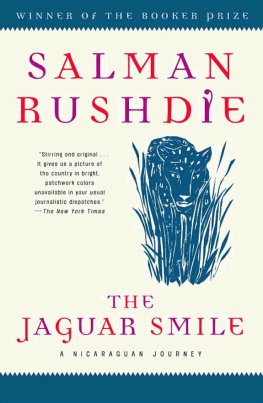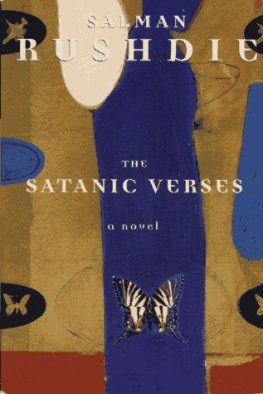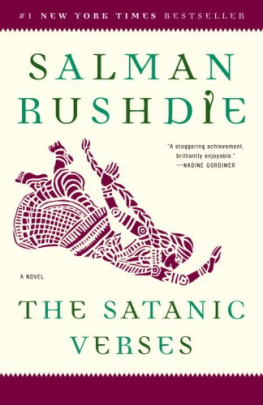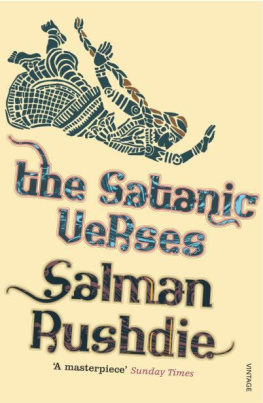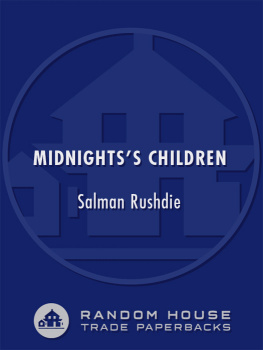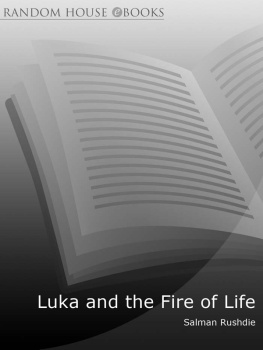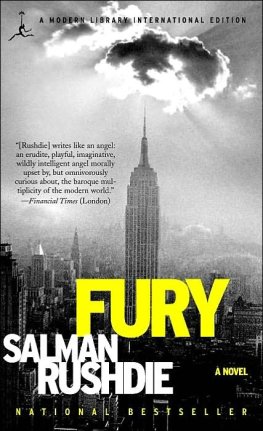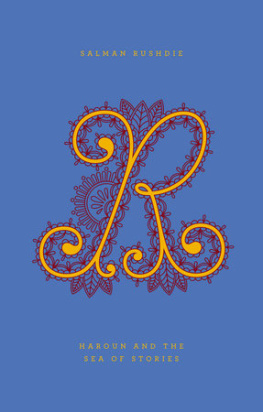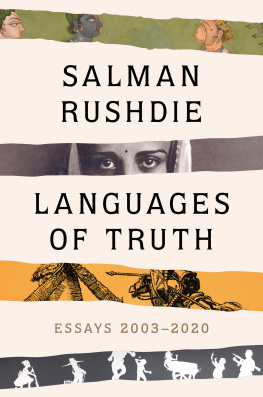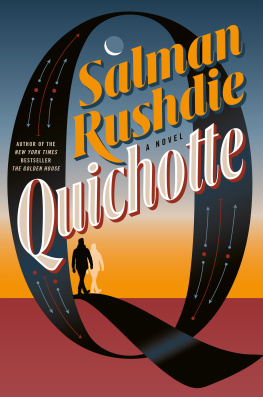Salman Rushdie
THE JAGUAR SMILE
A Nicaraguan Journey
There was a young girl of Nicragua
Who smiled as she rode on a jaguar.
They returned from the ride
With the young girl inside
And the smile on the face of the jaguar.
ANON

PREFACE TO THE 1997 EDITION

Its ten years since The Jaguar Smile was published. It was my first nonfiction book, and I well remember the shock of emerging, for the first time, from the (relatively) polite world of literature into the rough-and-tumble of the political arena. In the United States, then deeply involved in the low-intensity proxy war against Nicaragua, the tumbling was particularly rough. After my publication party in New York, I found myself at dinner at a wealthy uptown address, surrounded by the bien-pensant liberal lite. Arthur Schlesinger, Jr., on hearing that Id written a book about Nicaragua, embarking on a debunking of the Sandinistas that focused wittily on their mode of dress and lack of good society manners. This was a warning sign. If American liberals were so casually dismissive, conservatives were bound to be worse.
And so it proved. A prominent radio interviewer, in a live broadcast, greeted me with the question: Mr Rushdie, to what extent are you a Communist stooge? The New Republic gave the book an immensely long and rude review, perhaps the most vitriolic Id ever received. It turned out to have been written by one of the most important figures in the Contra leadership. I was inexperienced enough, in those days, to be genuinely surprised that a respectable journal should so brazenly abandon the principle of critical objectivity for the sake of some controversial copy. I am more worldly now.
In the last ten years, the world has changed so dramatically that The Jaguar Smile now reads like a period piece, a fairy tale of one of the hotter moments in the Cold War. The Soviet Union and Cuba are bogeymen that have long since lost their power to scare us. And in Nicaragua, the Contra war finally took its toll. A war-weary electorate voted out the FSLN, electing, instead, the same Doa Violeta Chamorro whom I had rather caustically described in my pages. Daniel Ortega surprised, even impressed, many of his international opponents by accepting the voters verdict. But at the same time, the Sandinistas were harshly criticized for pushing through, on behalf of many of their most prominent members, a last-minute land-grab of valuable real estate. (I have always wondered who ended up owning the comfortable Managua villa in which I was housed.) It was a characteristically contradictory Sandinista moment. When in power, they had acted, simultaneously, like people committed to democracy and also like harsh censors of free expression. Now, in their fall, they had behaved, once again simultaneously, like true democrats and also like true Latin-American oligarchs.
The FSLN sign on its hill overlooking Managua was altered, after the election, to read FIN. The End. In fact, Nicaraguan politics continued to be anything but straightforward. Dissension struck Doa Violetas ragbag anti-Sandinista coalition almost as soon as it took power, and on many occasions she was obliged to rule with the assistance of the votes of the Sandinista opposition. I had been struck, during my stay in Nicaragua, by the incestuous nature of the ruling class. Sandinistas and right-wingers had all gone to the same schools and dated each other. Now, it seemed, they were dating each other again.
But the stresses within the FSLN, what Marx would have called its inherent contradictions, did eventually arise to unmake it. During my visit I had been unable to meet the Sandinistas military strongman, Daniel Ortegas brother Humberto, head of the armed forces. (The absence of any effective investigation of the hard-liners Humberto Ortega, Toms Borge is a weakness in The Jaguar Smile. It seems probable that they were kept away from a non-Marxist like myself.) The differences between the Ortega brothers, and the group headed by Sergio Ramrez, whose key role it had been to persuade the urban middle class to support the revolution, became untenable. Ramrez left the movement, and the Sandinistas were hopelessly split. At the personal level, too, there were ruptures. Daniel Ortega and Rosario Murillo separated. Some of the people I had liked and admired left the country. The poet Gioconda Belli, for example, now lives in the United States. Her relationship with post-Sandinista Nicaragua is troubled and sad. And now a second election has been lost. Daniel Ortega has claimed that Arnoldo Alemns victory was achieved by widespread ballot-rigging, but the independent team of electoral observers has ratified the election results. Now it really does look like the FIN.
In 1986, the story of Nicaragua looked to me like a David-and-Goliath saga. The Sandinistas, for all their incompetences and faults (and, on re-reading, I am glad to find I said a good deal about those faults), seemed like U.S. cultural mythologys quintessential little guys who stand up against the Mister Bigs of the world and refuse to admit defeat. It looked, too, like a tale of unrequited love. Nicaragua, which loved the music, poetry and baseball of the United States, was being crushed by its powerful, careless beloved. Politics is not often so poignant.
A decade later, romance has given way to what cynical commentators call reality: that is, the irresistible power of super-power itself. Just do as we say, as the White House emissary told Foreign Minister dEscoto. Nowadays, in the epoch beyond the end of history, that instruction cannot be ignored. In 1986, Mario Vargas Llosa had spoken of the silent majority of anti-Sandinista democratic Nicaraguans, a majority that then seemed more like a wish than a truth; now, that majority exists. Mario would say it always existed, and if I am wrong, then he is right, but one might also argue that it was created. After a long, hopeless war, people will settle for peace, at almost any price. Now that the economic blockade is over and the ruined Nicaraguan economy has begun its slow recovery, it is easy to blame the old rulers for that blockade. The power of super-power: first to describe a given leadership as unacceptable; then to create the circumstances in which it becomes unacceptable; and finally to obliterate the memory of its (the super-powers) own part in the process.
I met Sergio Ramrez in a European hotel room a couple of years ago. He seemed heavier, more burdened. I have corresponded with Gioconda Belli. It is plain from these and other contacts that the story of which The Jaguar Smile is one chapter has not had a happy ending.

To re-read an old book is, inevitably, to have a sense of omissions, errors and regrets. There are one or two small howlers. In the account of the death of Julio Buitrago, I gave the impression that Doris Tijerino, among others, died with him. At the very moment I wrote this, Ms Tijerino was alive and occupying a prominent public position. Sorry, Doris.
I would like to have been clearer, too, about my difficulties with the Minister of Culture, Ernesto Cardenal. It was perhaps too polite of me to leave out the details of a speech I heard him give in Finland, in which he said that his beloved campesino poets were being given, as models, the poems of Ezra Pound and Marianne Moore in simplified form; and in which he claimed, heart-freezingly, that Nicaragua was the first nation on earth to have nationalized poetry. (A long-time literary opponent of the Soviet Union, seated near me, muttered,

